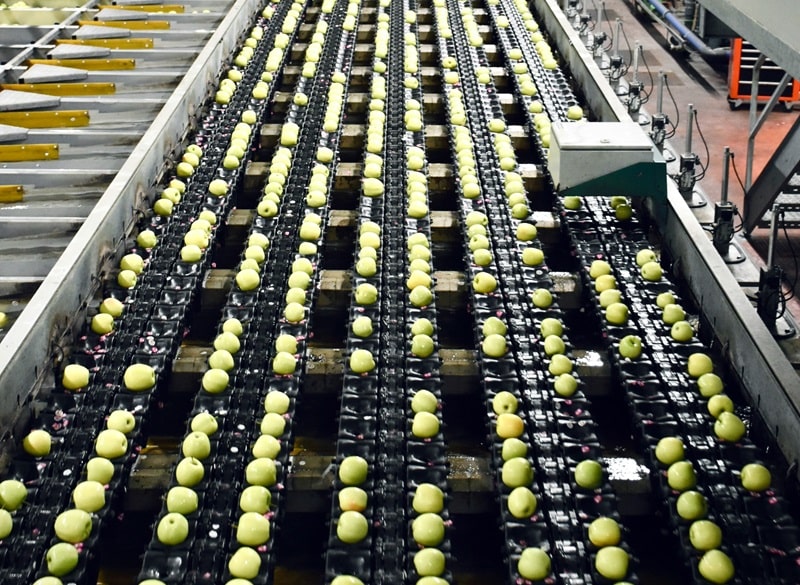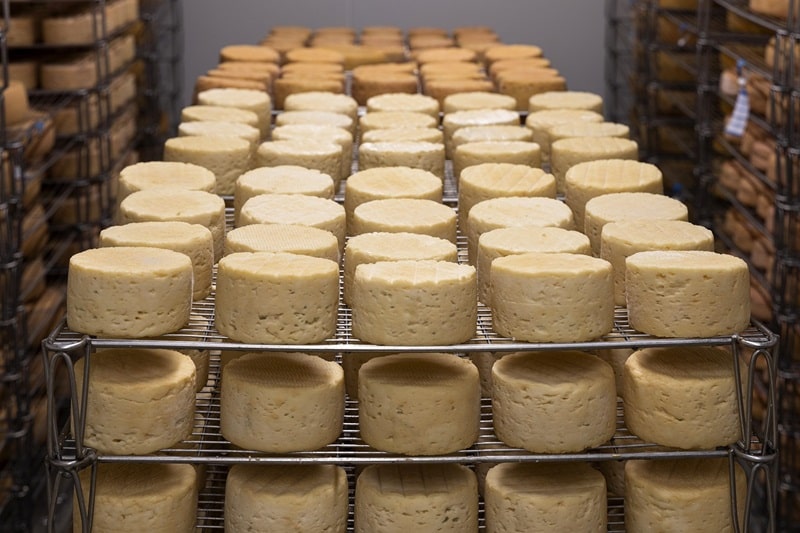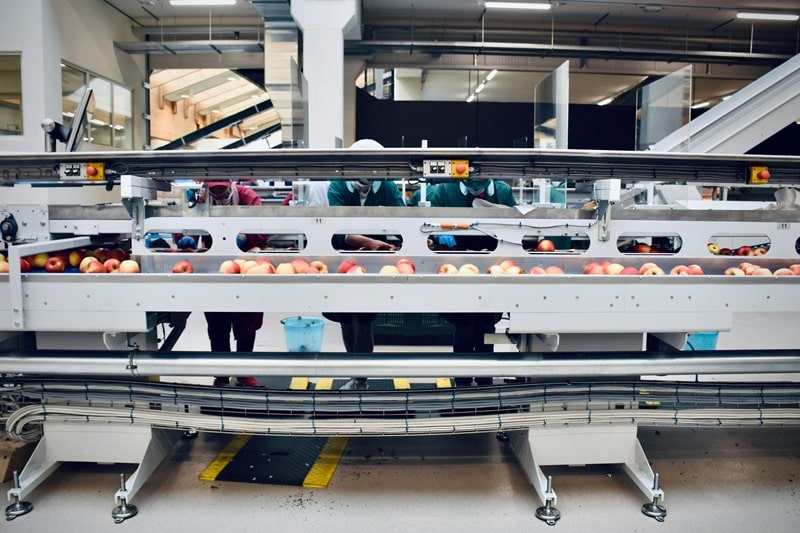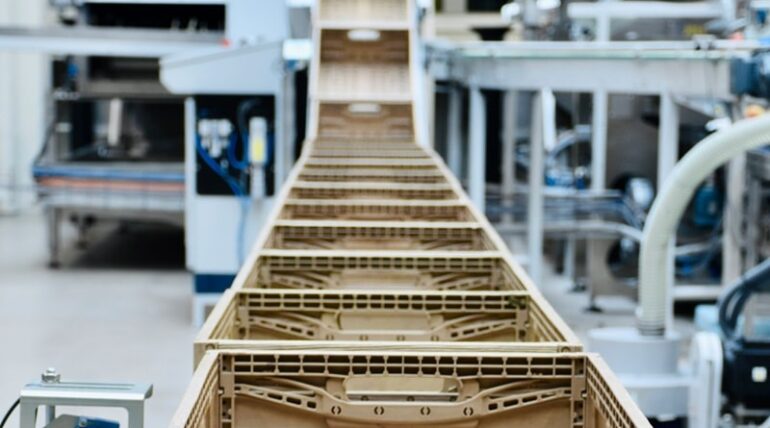A shocking one-third of the world’s food is wasted annually, leading to an array of consequences that have long-lasting impacts. While every stage of the supply chain contributes to this issue, an estimated 30-40% of total food production is lost before it even reaches the market, showcasing the importance of reducing food waste in food manufacturing companies.
To better understand the complex issue of food waste in manufacturing, businesses must explore innovative strategies to reduce, prevent, and manage food waste in a more environmentally friendly way.
Key Takeaways
- There are various economic and environmental benefits to reducing food waste in food manufacturing companies, such as reducing disposal and raw material costs, creating a potential new revenue stream, lowering greenhouse gas emissions, and contributing to a more sustainable manufacturing process.
- Production inefficiencies, packaging issues, overproduction, improper storage, and supply chain disruptions all contribute to food waste in manufacturing, all of which require tailored solutions to address the issue.
- To reduce waste, businesses should prioritize improved demand forecasting and inventory management. By leveraging advanced analytics, companies can align production with market needs by analyzing historical data, market trends, and customer behavior.
- Automated quality control helps businesses inspect products at different stages of production to detect defects early in the process. The adoption of new technology helps businesses streamline processes, reduce human errors, and maintain consistent quality standards.
- Recycling and composting provide various environmental benefits, such as improving landfill diversion and recycling nutrients back into the soil. Businesses that implement company-wide recycling initiatives can improve their brand image and set new standards in their industry.
Understanding Food Waste in Manufacturing
Businesses must be aware of the different types of food waste in the supply chain to reduce large-scale waste. At the manufacturing level, the different forms of food waste include:
- By-products: This involves all the waste generated during the production of primary products, including the disposal of items not typically consumed (like shells or bones), fruit and vegetable peels, and trimmings.
- Spoilage: Spoilage is a large contributor to waste, especially involving products with shorter lifecycles. This includes dairy products, eggs, bread, and fruits and vegetables that have been sliced.
- Overproduction: A large cause of food waste is overproduction, which not only wastes the product itself but also the water, land, energy, and labor required to produce it.
- Ugly produce: Ugly produce is an issue throughout the supply chain due to high aesthetic standards. For this reason, part of reducing waste in food manufacturing involves increased education campaigns and the promotion of products with blemishes.

Some of the causes behind these different types of waste include:
- Production inefficiencies: This includes errors in mixing or cooking, improper storage and transportation logistics, technical malfunctions, equipment failures, and poor handling techniques.
- Packaging issues: Improper packaging causes premature spoilage, therefore leading to waste at the manufacturing level.
- Improper storage: Food items must be stored at specific temperatures and humidity levels to maintain quality. If not, they may spoil before reaching consumers.
- Supply chain disruptions: This includes transportation delays, ingredient shortages, regulatory changes, and market volatility.
Strategies to Manage, Prevent, and Reduce Food Waste in Manufacturing
There are various ways to reduce and manage food waste in manufacturing, from optimizing processes to implementing recycling programs. Keep reading for a comprehensive look into waste management strategies.
Process Optimization
There are multiple approaches that businesses can explore to optimize their operations and reduce waste. This includes:
- Implementing lean manufacturing methods: Lean manufacturing methods focus on minimizing waste and maximizing productivity within manufacturing systems, making them a great approach for businesses. Value stream mapping is one of the techniques businesses can use to analyze, design, and manage the flow of waste, encouraging the continuous improvement of processes. Lean manufacturing also identifies the 8 different classifications of waste, which include defects, overproduction, waiting, non-utilized talent, transportation, inventory, motion, and extra processing. By identifying waste streams, businesses can improve their food manufacturing waste management strategy.
- Utilizing Six Sigma methodologies: This approach provides tools and techniques so that businesses can be more efficient and enhance process control. This methodology typically consists of five phases known as DMAIC, which stands for define, measure, analyze, improve, and control. By implementing Six Sigma methodologies, businesses can start minimizing defects and inefficiencies while reducing waste in food manufacturing.
- Establishing continuous improvement programs: Continuous evaluation and improvement programs help drive ongoing progress towards food waste reduction. This includes the regular assessment and refinement of processes and the involvement of employee feedback to optimize results.
Inventory and Supply Chain Management
Poor inventory and supply chain management are large contributors to food waste in manufacturing. To address these issues, businesses can:
- Use advanced analytics for accurate demand forecasting: Since overproduction causes food waste in large quantities, businesses should prioritize improved demand forecasting and inventory management. By leveraging advanced analytics, businesses can analyze historical data, market trends, and customer behavior, therefore aligning production with market needs and reducing waste.
- Adopt Just-In-Time (JIT) production: Rather than having a large stock inventory, JIT focuses on producing exactly the amount a business needs at exactly the time their customers need it. This approach minimizes excess inventory and reduces waste from overproduction and spoilage.
- Collaborate with suppliers: Improved communication throughout the supply chain helps align production levels with demand, ensuring the quality and timely delivery of raw materials. This improves quality control, reduces waste, and enhances overall resource efficiency.

Quality Control
Quality control helps identify and correct inefficiencies in the manufacturing process early on to improve sustainability goals. You can do this by:
- Implementing automated quality checks: Automated quality control helps businesses inspect products at different stages of production to detect defects early in the process. By leveraging advanced technology, businesses can streamline processes, reduce human errors, and maintain consistent quality standards.
- Use IoT and sensors for real-time monitoring: New technology has emerged to enable businesses to monitor production in real-time, helping them to detect and correct issues immediately. As companies increasingly implement new technologies in their business operations, it has proven to be a great tool for reducing food waste in food manufacturing companies.
Product Design and Packaging
Improper product design and packaging are large contributors to premature spoilage. To address this issue, businesses can implement:
- Innovative packaging: Smart packaging (the use of sensors and indicators to monitor the freshness of a product) and modified atmosphere packaging (the practice of modifying the composition of the internal atmosphere of a package) are two innovative approaches that businesses can use to extend the shelf life of their products. Businesses can also optimize packaging by using special materials and providing clear cooking and storage instructions to prevent waste at the consumer level.
- Sustainable packaging: There are multiple sustainable packaging alternatives that businesses can explore, such as biodegradable materials and edible films, coatings, and materials from food byproducts. These solutions are environmentally friendly and enhance brand reputation and marketability.
Employee Training and Engagement
Employee training is crucial to successfully implementing company-wide initiatives. Tips for proper employee training include:
- Creating clear policies: Multiple stages are typically involved in manufacturing processes, meaning each sector requires clear policies and instructions on new waste reduction initiatives. This reduces confusion and helps employees understand their role in minimizing waste.
- Conducting regular waste reduction training: Regular training sessions and workshops reinforce new policies and help employees feel more confident carrying out new waste reduction techniques. Since new policies require changes in everyday tasks, open communication with staff is crucial; this ensures they are aware of best practices and encourages them to provide feedback for optimal results.

Maintenance and Equipment Upgrades
To reduce the waste associated with equipment malfunctions, you should:
- Schedule regular preventative maintenance: Unexpected equipment malfunctions can cause production disruptions, unexpected downtime, and safety hazards. By keeping equipment in optimal condition, you can prevent breakdowns that lead to waste and financial loss.
- Invest in modern equipment: Advanced equipment is designed to streamline processes and enhance productivity, therefore reducing waste in food manufacturing. Overall, more efficient processing improves waste management capabilities, making it a beneficial investment in the food production industry.
Waste Audits and Data Analysis
An important part of food manufacturing waste management is the use of waste audits and data analysis. Keep reading to learn how low-waste companies implement these two things:
- Conduct regular waste audits: Food waste audits help companies identify how much waste is being produced, what type, and where it’s being produced. As a result, businesses have a clear idea of how much food waste their company generates, allowing them to create targeted strategies to improve sustainability efforts.
- Use data-driven decision-making: Analytic tools gather, process, and analyze data, making them a valuable tool in data-driven decision-making. By revealing trends and providing actionable insights, advanced technology assists businesses in creating effective reduction strategies.
Utilization of By-Products
Instead of discarding food by-products, you can use food scraps in a more environmentally friendly way, such as:
- Processing by-products into secondary products: There are multiple ways that businesses can upcycle by-products, such as converting food waste to animal feed and turning food waste to energy. These approaches help divert food from landfills and reduce the negative consequences of food waste.
- Collaborating with professional food waste management companies: Food by-product waste services provide businesses with tailored solutions, therefore facilitating company-wide initiatives and reducing food waste in food manufacturing companies. By creating partnerships with waste management companies, businesses can more easily reach their sustainability goals.
Recycling and Composting
Recycling and composting provide various environmental benefits, such as improving landfill diversion, reducing greenhouse gas emissions, and recycling nutrients back into the soil. Businesses can get involved by:
- Implementing industrial composting solutions: Composting food waste helps businesses manage both avoidable and unavoidable food waste, making it a valuable strategy for reducing waste in food manufacturing. In addition to effectively managing organic waste, composting improves soil health, encourages plant growth, and can create a new revenue stream for businesses.
- Establish food waste recycling programs: Food waste recycling saves businesses money, ensures they stay compliant with local regulations, and reduces their environmental footprint. By implementing large-scale recycling programs, businesses can stand out for their sustainability efforts and improve their brand image.

Benefits of Reducing Food Waste in Production
There are various economic and environmental benefits to reducing food waste in food manufacturing companies. From an economic standpoint, waste reduction provides potential cost savings by reducing disposal costs, lowering raw material costs, and improving efficiency. In addition, companies that upcycle their by-products into new materials can also create new revenue streams, therefore increasing profitability.
The environmental advantages of food waste reduction include lowering greenhouse gas emissions, minimizing landfill use, and contributing to a more sustainable manufacturing process. As a result, businesses that implement waste management strategies conserve natural resources, promote a circular economy, and foster a more sustainable future.
Future Trends and Innovations
There are various trends and technologies that have emerged to help reduce food waste throughout the supply chain. Food waste technology, for instance, has shown great potential in reducing waste, with advancements in AI, IoT, and biotechnology helping streamline many manufacturing processes.
AI for food waste management is a great example of how real-time monitoring can help optimize processes and reduce waste. Predictive analytics has also become a critical tool in the fight against food waste, working to predict future trends and events in order to reduce overproduction.
Another approach that businesses can leverage involves food waste and the circular economy, which focuses on avoiding waste and reusing and regenerating materials or products. In manufacturing, implementing a circular economy often involves optimizing the use of raw materials, improving packaging to extend the product’s shelf life, and implementing a food waste recycling strategy, among others.
The Bottom Line
Reducing food waste in food manufacturing companies is an important step towards reaching global and local sustainability goals. Businesses that want to reduce large-scale waste should leverage new technology, implement innovative approaches, and work with an experienced waste management company to ensure optimal results.
At Shapiro, we provide sustainable food waste disposal services that foster a zero-waste culture. We’ll work closely with you to create a tailored solution that meets your specific business needs.
To learn more about our organic waste management solutions, contact us today.
Baily Ramsey, an accomplished marketing specialist, brings a unique blend of anthropological insight and marketing finesse to the digital landscape. Specializing in educational content creation, she creates content for various industries, with a particular interest in environmental initiatives.



